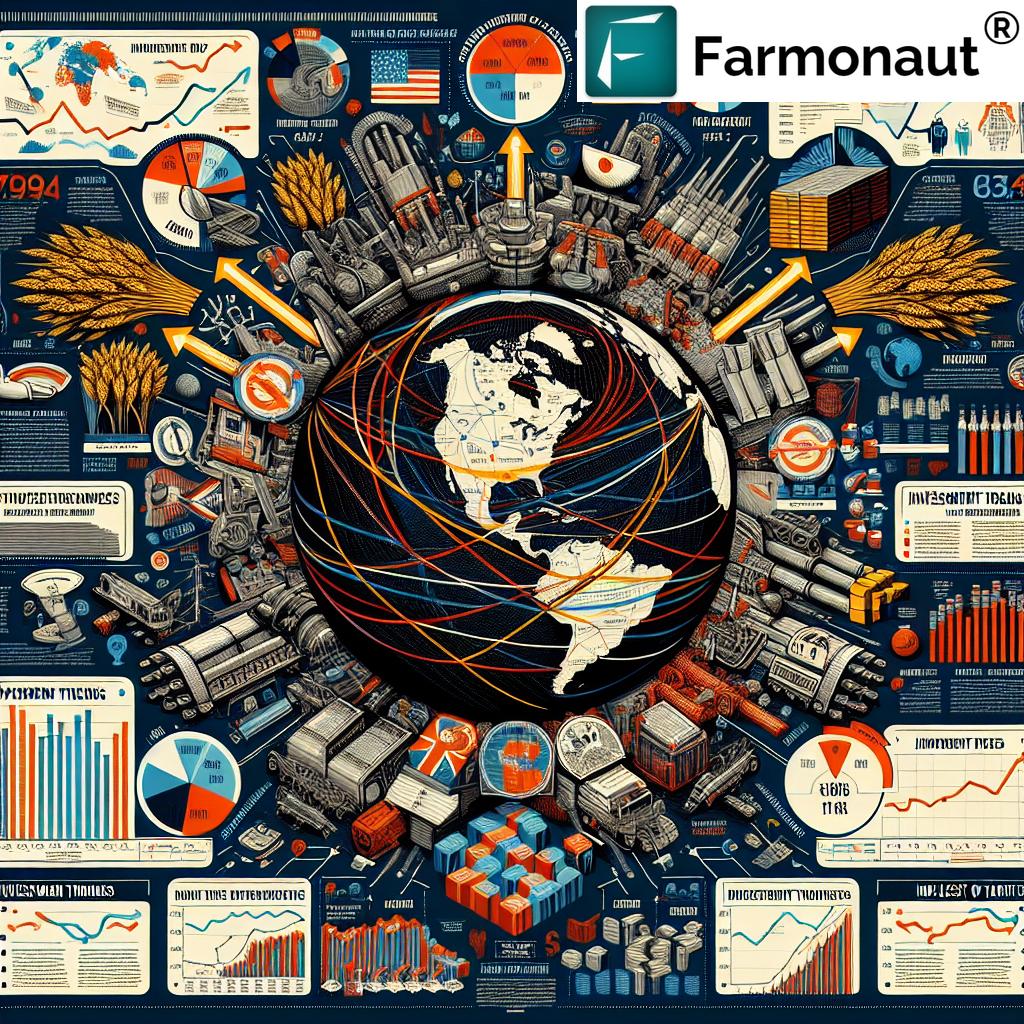US-China Economic Relations: Navigating Trade Tensions and Investment Opportunities in a Shifting Landscape
“US-China trade tensions have led to tariffs on $360 billion worth of Chinese goods and $110 billion of US exports.”
In recent years, we have witnessed a significant shift in the global economic landscape, particularly in the realm of US-China economic relations. As the world’s two largest economies grapple with trade tensions, policy shifts, and national security concerns, businesses, investors, and policymakers are faced with an increasingly complex environment to navigate. In this comprehensive analysis, we will explore the current state of US-China commercial relations, examine the impact of recent policy changes, and discuss potential investment opportunities amidst this shifting landscape.
The Evolution of US-China Economic Relations
The relationship between the United States and China has been a cornerstone of global economic growth for decades. However, recent years have seen a marked deterioration in this crucial partnership. The US-China Business Council, a Washington, D.C. nonprofit advocating for American companies doing business in China, had hoped for a reset in relations with a new presidential administration. Instead, we’ve seen a dramatic escalation of tensions, reshaping the global business landscape in unprecedented ways.

The Impact of Tariffs and Trade Policies
One of the most significant developments in US-China economic relations has been the implementation of tariffs by both countries. President Donald Trump initiated this trend by announcing a 10% tariff on all Chinese goods. In response, China retaliated with similar measures, imposing tariffs on various US products, including:
- Crude oil
- Agricultural machinery
- Certain U.S. cars
- Coal (15% tariff)
- LNG (15% tariff)
These tariffs have had far-reaching consequences for industries in both countries, affecting everything from manufacturing to agriculture. For instance, American farmers have faced significant challenges in exporting their products to China, a market that was once a major destination for US agricultural exports.
The Role of Rare Metals in Economic Strategy
“China’s rare earth metal exports, crucial for tech manufacturing, account for 80% of global production, impacting US industries.”
In addition to tariffs, China has taken strategic action by limiting the exports of five rare metals that are in high demand. This move has significant implications for various industries, particularly in the technology sector. Rare earth metals are crucial components in the manufacturing of electronics, electric vehicles, and renewable energy technologies. By restricting these exports, China has leveraged its dominant position in the rare earth market to exert pressure on the US and other countries reliant on these resources.
Steel and Aluminum: A Focal Point of Tension
The steel and aluminum industries have become a particular flashpoint in US-China trade relations. President Trump’s decision to impose a 25% tariff on imported aluminum and steel has had significant repercussions for both domestic and international markets. This move was aimed at protecting American steel and aluminum producers, but it has also led to increased costs for industries that rely heavily on these materials, such as automotive manufacturing and construction.
Interestingly, the impact of these tariffs extends beyond just China. The global nature of steel and aluminum trade means that even steel sourced from other countries, like that used in Trump’s Las Vegas hotel, has been affected by these policies.
The Agricultural Sector: Caught in the Crossfire
The agricultural sector has been particularly affected by the ongoing trade tensions between the US and China. American farmers, who have long relied on Chinese markets for their exports, have found themselves caught in the crossfire of these economic disputes. The tariffs imposed by China on US agricultural products have led to a significant decrease in exports, causing financial strain for many American farmers.
In response to these challenges, companies like Farmonaut have emerged to provide innovative solutions for the agricultural sector. Through its advanced satellite-based farm management solutions, Farmonaut offers farmers valuable tools for crop health monitoring, resource management, and AI-based advisory systems. These technologies can help farmers optimize their yields and reduce costs, potentially mitigating some of the negative impacts of the trade tensions.
Technological Advantages and National Security Concerns
The interplay between technological advancement and national security has become a central issue in US-China relations. Both countries are striving to maintain and enhance their technological advantages, leading to increased scrutiny of cross-border investments and technology transfers. This has resulted in:
- Stricter regulations on foreign investments in critical technologies
- Enhanced export controls on sensitive technologies
- Increased focus on cybersecurity and data protection
These measures have significant implications for businesses operating in both countries, particularly in sectors such as telecommunications, artificial intelligence, and semiconductor manufacturing.
Investment Opportunities in a Changing Landscape
Despite the challenges posed by the current trade tensions, there are still significant investment opportunities for businesses willing to navigate this complex landscape. Some areas of potential growth include:
- Green technology and renewable energy
- Healthcare and biotechnology
- Digital infrastructure and 5G technology
- Advanced manufacturing and robotics
Companies that can adapt to the changing regulatory environment and leverage technological innovations stand to benefit in this new economic reality.
The Role of Innovation in Economic Resilience
In the face of these economic challenges, innovation has become more crucial than ever. Companies that can develop new technologies and business models are better positioned to thrive in this uncertain environment. For instance, Farmonaut’s use of satellite imagery, artificial intelligence, and blockchain technology in agriculture demonstrates how innovation can create new opportunities even in traditional sectors.
Explore Farmonaut’s API for innovative agricultural solutions
Comparative Analysis of US-China Economic Relations
| Economic Indicator/Policy | United States | China |
|---|---|---|
| GDP Growth Rate (estimated) | 2.1% | 5.2% |
| Trade Balance (estimated) | -$900 billion | +$600 billion |
| Tariff Rates on Key Products | 25% on steel, 10% on aluminum | 25% on various US goods |
| Investment Restrictions | Increased scrutiny on Chinese investments | Selective opening of markets to foreign investors |
| Technology Export Controls | Stricter controls on high-tech exports | Restrictions on rare earth metal exports |
| Recent Policy Shifts | Focus on reshoring and domestic manufacturing | Dual circulation strategy emphasizing domestic consumption |
The Future of US-China Economic Relations
As we look to the future, it’s clear that the relationship between the United States and China will continue to be a defining factor in the global economy. While tensions remain high, there are also opportunities for cooperation and mutual benefit. Both countries have a vested interest in maintaining economic stability and promoting global growth.
Key areas for potential collaboration include:
- Climate change and environmental protection
- Global health initiatives
- International financial stability
- Technological innovation in non-sensitive sectors

Implications for Global Trade and Investment
The ongoing changes in US-China economic relations have far-reaching implications for global trade and investment patterns. We are witnessing a shift towards regionalization of supply chains, increased emphasis on national security in economic decision-making, and a reevaluation of global trade agreements.
For businesses operating internationally, this new landscape requires:
- Greater agility in supply chain management
- Enhanced risk assessment and mitigation strategies
- A deeper understanding of geopolitical factors affecting trade
- Increased focus on localization and market diversification
The Role of Technology in Shaping Economic Relations
Technology continues to play a pivotal role in shaping economic relations between the US and China, as well as in global trade more broadly. Advancements in areas such as artificial intelligence, 5G networks, and quantum computing are not only driving economic growth but also raising new questions about data security, intellectual property rights, and technological sovereignty.
Companies like Farmonaut demonstrate how technology can be leveraged to address global challenges in sectors like agriculture. By providing advanced satellite-based solutions and AI-driven insights, Farmonaut is helping to increase agricultural productivity and sustainability, which are crucial issues in both the US and China.
Balancing Economic Growth and National Security
One of the key challenges in US-China relations is striking a balance between promoting economic growth and safeguarding national security interests. Both countries are grappling with how to maintain technological advantages while fostering innovation and economic development. This balancing act has led to:
- Increased scrutiny of foreign investments in critical technologies
- Tighter controls on technology transfers
- Greater emphasis on developing domestic capabilities in key industries
For businesses, navigating this landscape requires a nuanced understanding of both economic opportunities and potential security concerns.
The Impact on American Workers and Farmers
The evolving US-China economic relationship has had significant impacts on American workers and farmers. While some industries have benefited from protectionist policies, others have faced challenges due to reduced access to Chinese markets and increased costs of inputs.
For farmers, in particular, the trade tensions have led to:
- Reduced exports to China, a key market for many agricultural products
- Increased uncertainty in commodity prices
- The need to find alternative markets for their products
In response to these challenges, many farmers are turning to technologies like those offered by Farmonaut to optimize their operations and increase their competitiveness in a changing global market.
The Role of International Institutions
As US-China economic relations continue to evolve, international institutions such as the World Trade Organization (WTO) face new challenges in mediating disputes and maintaining a rules-based international trading system. The effectiveness of these institutions in addressing the complex issues arising from US-China trade tensions will be crucial in shaping the future of global trade.
Conclusion: Navigating the Future of US-China Economic Relations
As we navigate this shifting landscape of US-China economic relations, it’s clear that businesses, policymakers, and investors must remain adaptable and forward-thinking. While challenges persist, there are also opportunities for those who can effectively navigate this complex environment.
Key takeaways include:
- The need for diversified supply chains and market strategies
- The importance of staying informed about policy changes and their implications
- The potential for innovation and technology to create new opportunities
- The ongoing importance of the US-China relationship in shaping global economic trends
By understanding these dynamics and leveraging innovative solutions like those offered by Farmonaut, businesses can position themselves to thrive in this new era of US-China economic relations.
Earn With Farmonaut: Join our affiliate program and earn 20% recurring commission by sharing your promo code and helping farmers save 10%. Onboard 10 Elite farmers monthly to earn a minimum of $148,000 annually—start now and grow your income!
FAQs
- How have US-China trade tensions affected global supply chains?
Trade tensions have led to a reevaluation of global supply chains, with many companies seeking to diversify their suppliers and reduce dependence on any single country. - What are the key industries affected by US-China tariffs?
Industries significantly impacted include agriculture, automotive, technology, and steel manufacturing. - How are rare earth metals influencing US-China economic relations?
China’s dominance in rare earth metal production gives it leverage in negotiations, as these materials are crucial for many high-tech industries. - What role does technology play in current US-China economic tensions?
Technology is a central issue, with both countries competing for dominance in areas like 5G, AI, and semiconductor manufacturing. - How can businesses adapt to the changing US-China economic landscape?
Businesses can adapt by diversifying markets, investing in innovation, and staying informed about policy changes.







